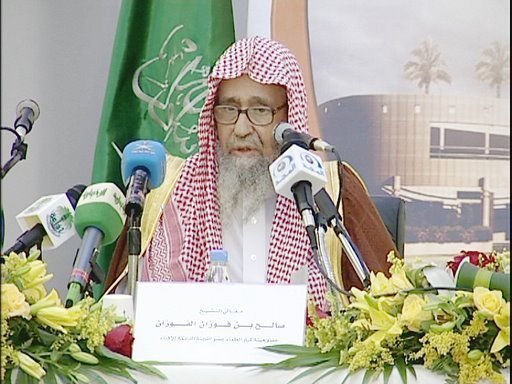Sheik Saleh Al-Fawzan is a leading Saudi Government cleric and author of the country’s religious curriculum and he believes Islam advocates slavery. Remember that Saudi Arabia didn’t change over the past few years. They are the keepers of the early literal Islam and a totalitarian political theocracy. Read this post and the commentary by Daniel Pipes.
Published: November 10, 2003; Saudi Sheik: “Slavery is a part of Islam.”
“Slavery is a part of Islam,” says Sheik Saleh Al-Fawzan, according to the independent Saudi Information Agency, or SIA.
In a lecture recorded on tape by SIA, the sheik said,
“Slavery is part of jihad, and jihad will remain as long there is Islam.”
His religious books are used to teach 5 million Saudi students, both within the country and abroad, including the United States.
Al Fawzan – a member of the Senior Council of Clerics, Saudi Arabia’s highest religious body – says Muslims who contend Islam is against slavery “are ignorant, not scholars.”
“They are merely writers,” he said, according to SIA. “Whoever says such things is an infidel.”
Al-Fawzan’s best-known textbook, “Al-Tawheed – Monotheism,” says most Muslims are polytheists, and their blood and money are therefore free for the taking by “true Muslims.”
SIA said although the Saudi government claims religious curriculum is being reformed, Al-Fawzan’s books are still in wide use.
Al-Fawzan is a member of the Council of Religious Edicts and Research, the Imam of Prince Mitaeb Mosque in Riyadh and a professor at Imam Mohamed Bin Saud Islamic University, Saudi Arabia’s main center of learning for the strict Wahhabi interpretation of Islam.
SIA noted Al-Fawzan, a leading opponent of curriculum reform, opposes elections and demonstrations as Western influences, is against Arab women marrying non- Arab Muslims and has issued a fatwa forbidding the watching of television.
Al-Fawzan has threatened to behead a Saudi writer and scholar, Sheik Hassan Al-Maliki, for his criticism of Wahhabism, according to SIA. Al-Maliki was fired from his position with the ministry of education after writing a 50- page paper criticizing Al-Fawzan’s book “Al-Tawheed.”
Saudi Religious Leader Calls for Slavery’s Legalization
Published: November 07, 2003; Saudi Religious Leader Calls for Slavery’s Legalization.
By Daniël Pipes,
I wrote about slavery in discussing the future of Islam in July 2002, commenting that things can get better for Islam but this “requires that Muslims tackle the huge challenge of adapting their faith to the realities of modern life.” By way of examples, I offered two:
Five hundred years ago, Jews, Christians and Muslims agreed that owning slaves was acceptable but paying interest on money was not. After bitter, protracted debates, Jews and Christians changed their minds. Today, no Jewish or Christian body endorses slavery or has religious qualms about paying reasonable interest.
Muslims, in contrast, still think the old way. Slavery still exists in a host of majority-Muslim countries (especially Sudan and Mauritania, also Saudi Arabia and Pakistan) and it is a taboo subject. To enable pious Muslims to avoid interest, an Islamic financial industry worth an estimated $150 billion has developed.
The challenge ahead is clear: Muslims must emulate their fellow monotheists by modernizing their religion with regard to slavery, interest and much else. No more fighting jihad to impose Muslim rule. No more endorsement of suicide terrorism. No more second-class citizenship for non-Muslims.
Well, I was wrong about slavery being a taboo subject. We learn today from the dissident Saudi Information Agency that a prominent Saudi religious authority recently called for slavery to be re-legalized in the kingdom. Ali Al-Ahmed reports on the views of Sheikh Saleh Al-Fawzan, the author of a religious textbook (At-Tawhid, “Monotheism”) widely used to teach Saudi high school students as well as their counterparts abroad studying in Saudi schools (including those in the West).
“Slavery is a part of Islam,” he announced in a recent lecture. “Slavery is part of jihad, and jihad will remain as long there is Islam.” He argued against the idea that slavery had ever been abolished, insulting those who espouse this view as “ignorant, not scholars. They are merely writers. Whoever says such things is an infidel.”
Al-Fawzan is no maverick. He is:
- A member of the Senior Council of Clerics, Saudi Arabia’s highest religious body;
- A member of the Council of Religious Edicts and Research;
- Imam of the Prince Mitaeb Mosque in Riyadh; and
- Professor at Imam Mohamed Bin Saud Islamic University, the main Wahhabi center of learning.
That such a viewpoint can be asserted by a card-carrying member of the Saudi religious establishment is a tragic commentary on the state of Islamic discourse today.



 RSS
RSS











“Slavery Is A Part Of Islam” #Islam http://j.mp/cUZuGM
RT @CrethiPlethi: “Slavery Is A Part Of Islam” #Islam http://j.mp/cUZuGM
[…] This post was mentioned on Twitter by Elisabeth, Crethi Plethi. Crethi Plethi said: “Slavery Is A Part Of Islam” #Islam http://j.mp/cUZuGM […]
[…] Saleh Al-Fawzan, a prominent Saudi religious figure justifies slavery in Islam, why not an Egyptian writer praise […]